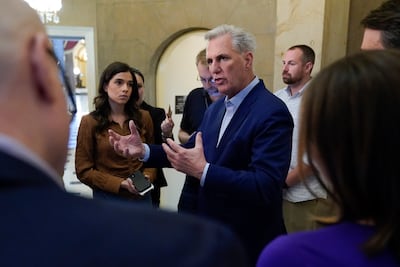President Joe Biden and Republican House Speaker Kevin McCarthy spoke of being "optimistic" on Monday despite disagreements after a third meeting on the US debt ceiling.
There are only 10 days remaining until the US faces a catastrophic default on its debt.
"I am optimistic we are going to make some progress," Mr Biden said.
"We still have some disagreements, but I think we may be able to get where we have to go," Mr Biden told reporters. "We both know we have a significant responsibility."
Mr McCarthy also said there had been disagreements, but added: "I think at the end of the day we can find common ground."
Yet no agreement appeared imminent even as US Treasury Secretary Janet Yellen warned “it is highly likely” her department will not be able to pay its bills on time in June.
Monday's meeting follows a weekend of stop-start discussions, and negotiators between the two parties continued to hold talks on Sunday night. Mr Biden and McCarthy also spoke by phone.
Mr McCarthy described his call with Mr Biden, who was attending the G7 meeting in Japan on Sunday, as “productive” and said discussions were focused on spending cuts.
The two leaders said there was difficulty in attaining an agreement that would pass both the closely divided House of Representatives and Senate.
"We reiterated once again that default is off the table and the only way to move forward is in good faith toward a bipartisan agreement," Mr Biden said in a statement after the meeting.
The US president said negotiations would continue between teams at the White House and on Capitol Hill, but did not outline any timing on "our path forward".
Failure to reach an agreement on the debt ceiling and defaulting would have profoundly negative impacts on the US and global economy.
Unemployment and interest rates will surge, the US economy would enter a recession and the stock market would lose 45 per cent of its value, Ms Yellen declared.
“My assessment is that the odds of reaching June 15, while being able to pay all of our bills, is quite low,” Ms Yellen also told NBC News on Sunday.
She said June 1 was the "hard deadline" before the US defaults on its $31.4 billion debt limit.
Even approaching the June 1 deadline without a deal will have negative effects on the economy, she added.

But with time running out, there is still some distance that Mr Biden and Mr McCarthy must cover before they strike a deal.
Republicans want to cut next year's spending to 2022 levels with caps on future expenditure, as well as work requirements on social programmes. Mr Biden criticised “extreme” Republicans for their position.
“It's time for Republicans to accept that there is no deal to be made solely, solely, on their partisan terms,” he said in Japan.
Meanwhile, some Democrats in Congress are calling on the president to invoke the 14th Amendment, a Civil War-era law that states “validity of the public debt … shall not be questioned”, potentially giving Mr Biden the authority to unilaterally raise the debt ceiling.
Mr Biden said he believes he has the authority to invoke the 14th Amendment, but it would undoubtedly be challenged in court.
Ms Yellen called the idea “legally questionable”.
Such a move appears unlikely at this stage, with multiple media outlets reporting officials within the White House do not see invoking the 14th Amendment as an option to circumvent negotiations.
